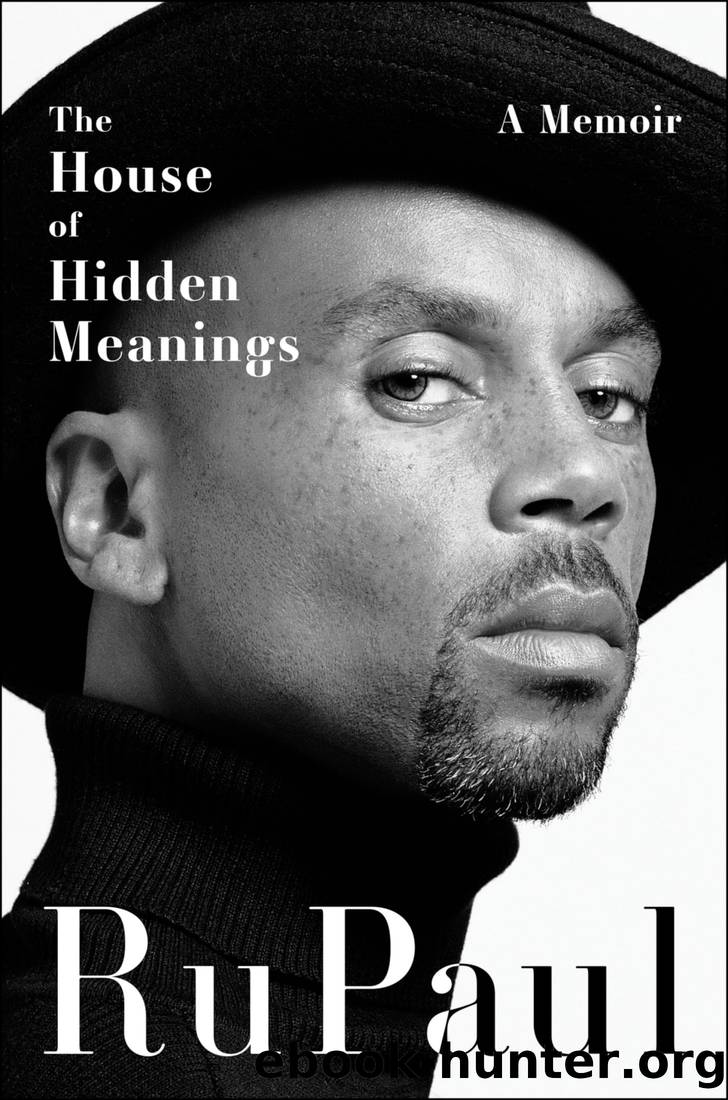The House of Hidden Meanings: A Memoir by Rupaul

Author:Rupaul [Rupaul]
Language: eng
Format: epub
Tags: Biography & Autobiography, Entertainment & Performing Arts, Personal Memoirs, History, United States, 20th Century, Lgbtq, Cultural; Ethnic & Regional, African American & Black
ISBN: 9780063263925
Google: b_rMEAAAQBAJ
Publisher: HarperCollins
Published: 2024-03-05T06:00:00+00:00
SEVEN
âTo be purely objectified in the sexual hierarchy, perceived as genuinely sexy,
Snipe
as opposed to set apart from the worldâit felt new, after being shut out of that for so long.â
The story in my family went like this: When my mother was pregnant with me, she went to see a psychic, who told her that the baby she was carrying was a boy and that he was bound to be famous. With that in mind, she gave me the name RuPaul because, as she put it, âAinât another motherfucker alive with a name like that.â Fame, for me, was less a dream than a predestination.
I had grown up loving the stars Iâd seen on television. But it was clear to me from an early age that there were plenty of people out there who were talented as singers or actors or dancers, or even at all three, and not all of them made it in the entertainment industry. The ones who stuck around, it seemed, had an added element that people could rally around. They werenât just talents. They were something else. Consumers are always looking for something proprietary in a product that offers more than the thing itself, whatever its utility. They want a vocabulary, a lifestyle, an aesthetic that goes along with whatever theyâre buying. Nowadays, we call that a brand.
Diana Ross had this figured out. She just had that âItâ factor. It was difficult to take your eyes off her. Of course, she is an extraordinary singer, a charismatic performer, and a brilliant actress. But she is about something more than that. At the height of her fame, she meant so much to me, as she did to many Black people, because she represented everything we wanted to project into pop culture at that time, and that was: You donât have to be afraid of us, white people. We can be everything that you can be and more. It was never said, but always understood: Diana Ross represented the release of centuries-old baggage associated with Black. You could invite Diana Ross, I felt, to any home in America and she would be welcomeâthatâs how beloved she was.
Then there was Cher, who was unapologetically rebellious. Her talent is legion, but her personality was what made me love her. I could see that she didnât act the way other women acted, fawning and flirting at the carrot of male attention. She was stone-faced. She seemed disaffected in a way that I admired.
At around thirteen, I became a student of David Bowie. Likewise, no matter how exceptional his talents, it was his personal presentation that was revolutionary. He never seemed to make an event of the fact that everything he did was weird and transgressive; it was tossed-off, casual, rendered with a sense of ease that spoke to every kid who was drawing outside the lines.
Two bands born in the Atlanta scene had made it big, too: The B-52s, who made scruffy garage-party songs, a kind of postmodern, Warholian commentary on pop music.
Download
This site does not store any files on its server. We only index and link to content provided by other sites. Please contact the content providers to delete copyright contents if any and email us, we'll remove relevant links or contents immediately.
| Actors & Entertainers | Artists, Architects & Photographers |
| Authors | Composers & Musicians |
| Dancers | Movie Directors |
| Television Performers | Theatre |
Cecilia; Or, Memoirs of an Heiress — Volume 2 by Fanny Burney(31945)
Cecilia; Or, Memoirs of an Heiress — Volume 3 by Fanny Burney(31929)
Fanny Burney by Claire Harman(26597)
We're Going to Need More Wine by Gabrielle Union(19034)
Plagued by Fire by Paul Hendrickson(17405)
All the Missing Girls by Megan Miranda(15957)
Cat's cradle by Kurt Vonnegut(15335)
Bombshells: Glamour Girls of a Lifetime by Sullivan Steve(14057)
For the Love of Europe by Rick Steves(13908)
Leonardo da Vinci by Walter Isaacson(13316)
4 3 2 1: A Novel by Paul Auster(12375)
The remains of the day by Kazuo Ishiguro(8975)
Adultolescence by Gabbie Hanna(8922)
Note to Self by Connor Franta(7663)
Diary of a Player by Brad Paisley(7559)
Giovanni's Room by James Baldwin(7327)
What Does This Button Do? by Bruce Dickinson(6195)
Ego Is the Enemy by Ryan Holiday(5414)
Born a Crime by Trevor Noah(5375)
